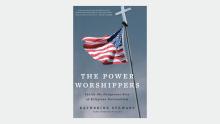Religious Right
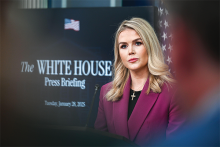
AT TIMES, WHITE HOUSE press secretary Karoline Leavitt proudly wears a gold cross when meeting with the press pool. Many assume she emerges from the heart of right-wing American evangelicalism. But they would be wrong. Leavitt emerges from the heart of right-wing American Catholicism. While we have been focused on the fusion of evangelical Christianity and Far Right nationalism, we’ve missed how Christian nationalism has risen in Catholic and Orthodox traditions. Are former evangelicals — or “exvangelicals” — who resist Christian nationalism also contributing to its smokescreen?
“Christian nationalism” is an idea from academia that has become a bit overused. Fortunately, sociologists Andrew L. Whitehead and Samuel L. Perry provide a narrower, more workable definition. Christian nationalism, they write, is an “ideology that idealizes and advocates a fusion of Christianity and American civic life.”
In the past 50 years, this ideology has increasingly emerged as a visible force in American life, as the Religious Right walked onto the political scene and into the center of the Republican Party. For all that time, the image in the popular mind of the Christian nationalist has been stereotypically the (often Southern, but not always) white evangelical denizen of megachurches replete with rock bands and biblical literalism.
Colorado was one of the epicenters of that subculture, in part due to James Dobson’s Focus on the Family, based in Colorado Springs. I grew up in that region when the subculture was reaching its zenith in the 1990s, and it was clear that our evangelical neighbors did not think of my family’s Greek Orthodox faith as “Christian.” As a marginal minority in a context where evangelical Christians dominated the state’s cultural and political life, this experience prompted my interest in the history of religion; specifically, in how people construct idiosyncratic versions of history and identity for political ends. Over the years, I’ve watched the Religious Right morph into something new and virulent. Many of those raised in its most extreme cultures have migrated out of nondenominational evangelicalism to Orthodox Christianity or Catholicism. Others left Christianity altogether, joining the unaffiliated or “nones.” Many of the millennial (born between 1981 and 1996) and Generation Z (1997 to 2012) children of American evangelicalism became disaffected with their upbringing and the limited worldview it offered.
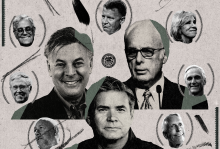
IN NOVEMBER, THE United States joined Argentina (Javier Milei), India (Narendra Modi), and Hungary (Viktor Orbán), among other countries, when it elected an authoritarian as its chief executive. In the case of Donald J. Trump, examples of these far-right tendencies include plans for mass deportations, promises to replace nonpartisan government employees with loyalists, and threats to put political critics on trial.
How did we get here? And what do we need to know to mitigate harm, save what and who we can, and work toward a more free and equitable future? Some of us may feel weary and defeated, but journalist Katherine Stewart, who has investigated the authoritarian movement for more than 15 years, encourages curiosity: “We can’t address our problems unless we know what they are.” Those problems include “decades of investment in a larger anti-democratic movement that would not have dissolved even if they had been defeated at the ballot box in this election cycle.”
In her forthcoming book, Money, Lies, and God: Inside the Movement to Destroy American Democracy, Stewart explores a network of strange bedfellows who drive a broad authoritarian movement both in the United States and abroad. The players in this network have different motivations: Ultra-rich funders aim to destroy the regulatory state to gain even more wealth, funneling resources to groups that further their aims. “New Right” academics and proto-academics pursue the ascendance of their pet ideologies. Veteran political operatives find new partners in the hunt for power.
Though many of the funders and power players within this movement are not Christian or even religious, Christian symbols, pastors, and churches have played a key role. Christian leaders — white evangelicals, but also conservative Catholics, Pentecostals, and others — and the warped theologies they peddle have helped convince voters that we are in a state of emergency. As evidence, these Christians baptize anxieties about sexuality and gender, the economy, and shifting demographics as evidence that America has lost its way and needs to be saved by a strongman.
Stewart’s other books include The Good News Club: The Christian Right’s Stealth Assault on America’s Children (2012) and The Power Worshippers: Inside the Dangerous Rise of Religious Nationalism (2020), which was the basis for the 2024 documentary God & Country. Stewart spoke with Sojourners editor Julie Polter before and after the November 2024 U.S. election. This interview has been edited for length and clarity.
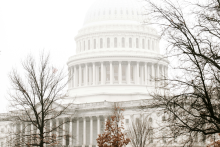
First unveiled in April 2023, and endorsed by more than 100 conservative organizations, Project 2025 is a 922-page document that serves as a to-do list for the next conservative president to accomplish. Activists, journalists, and many religious leaders have been warning the public for months about what they see as some of Project 2025’s more extreme policy proposals and the ways in which the blueprint would push our nation toward autocracy and Christian nationalism.

RICH MULLINS HAD a museum of a personality. The singer-songwriter, who died in a car accident in 1997, loved to show off anything he found interesting, his friends say. From music to movies to the places he traveled, Mullins loved “for you to experience what he loved,” his friend and collaborator Mitch McVicker told Sojourners.And more than just about anything else, Mullins loved Jesus.
Mullins’ career tracked alongside the evolution of contemporary Christian music (CCM), which went from marginal in the 1970s to a powerhouse genre that sold a combined 31 million albums in 1996. Best known for the modern hymn “Awesome God,” Mullins wrote his fair share of songs that fit Christian radio. But more often, his music was a kaleidoscope of faith and humanity, offering a tour of human frustration and failure.
On “Hard to Get,” Mullins, as modern psalmist, asks God, “Do you remember when you lived down here, where we all scrape to find the faith to ask for daily bread? / Did you forget about us, after you had flown away?”
In other places, Mullins plays minor prophet. “I wrote this for the Religious Right,” he declared before singing that Jesus “came without an axe to grind [and] did not toe the party line,” during a performance of “You Did Not Have a Home.”
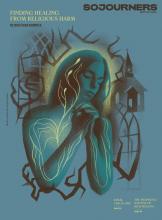
Healing from religious harm: Why compassionate community is part of the journey.
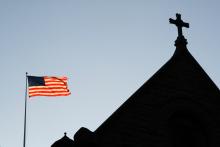
Churches have been barred from directly supporting or opposing candidates since the passage of the Johnson Amendment in 1954. But pastors can still work on the election in meaningful ways without jeopardizing their tax-exempt status, so long as they are mindful of the rules.

The Religious Right was not wrong to tell people of faith that the Bible is political. Its critical mistake and enduring sin is not that it challenged Christians to engage in public life, but that it invited us to join a reactionary coalition driven by racial fear, male chauvinism, and corporate greed. Decent people with sincere motives joined the Moral Majority and the Christian Coalition to put their faith into practice. But these organizations made fallible people worse than we would have been otherwise. They led us astray.

The president has used racism to spread his political agenda, and American Christendom has been an eager participant.

It seems that no matter where we look, we are confronted with alliances between the religious right and the political right. The Christian right in the U.S. sees Donald Trump and his administration as some sort of a messiah for white Protestant Christianity. In Muslim-majority Southeast Asian states like Malaysia and Indonesia, various levels of government are finding it hard to not acquiesce to the demands made by conservative Muslim groups on matters related to condemning the LGBT community. Perhaps such incursions by the religious right into politics have become more prominent recently because they are abetted by the ascendancy of the authoritarian and anti-intellectual personality.

MANY politically conservative evangelical Christians have been not too subtly transforming God into a transcendental member of the right wing of the Republican Party. It is not just a matter of their making a biblical case for their political agenda; they seem to be going further than that. They are giving the impression that anyone who disagrees with their agenda is outside the will of God. These people have been so effective in associating evangelical Christianity with right-wing Republicanism that to the secular press the word “evangelical” has come to mean the Christian Coalition.
This recent development has generated great consternation among many of us who, over the last few decades, have used the word “evangelical” to establish our own religious identity. We now have to ask, Can we continue to use that title? We hold to the orthodox theology of evangelicalism, but we are not about to buy into all the values and programs espoused by the Religious Right. ...

A widely-respected white evangelical leader recently expressed to me his personal agony over how “white evangelicalism has destroyed the ‘evangel’ of Jesus — the bringing of ‘good news’ to the poor.” Another leader of a top national evangelical organization told me in a personal conversation that evangelical support of Trump “will destroy our integrity for at least a generation.”

After a quarter-century, the Rev. Barry Lynn is retiring as head of Americans United for Separation of Church and State.
In court, in congressional hearings, and on cable television, Lynn has led the fight against school-sponsored prayer, religious symbols on public property, and any law that allows government to privilege people of faith.
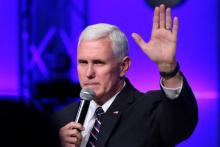
A decade ago, a critic accused me of writing a book about a “nonexistent” threat from the religious right. One reviewer called my work a “paranoid rant,” while another detractor wrote my “alarmist” views were “exaggerated and implausible.”
In The Baptizing of America: The Religious Right’s Plans For The Rest Of Us, published in 2006, I had warned that a well-financed and highly organized group of religious and political leaders was seeking to impose their narrow extremist beliefs and harsh public policies on the United States, even as our nation’s population was increasingly multireligious, multiethnic, and multiracial.

Safety is defined in the nineteenth chapter of Leviticus as abiding in God’s sense of justice —“not be partial to the poor or defer to the great: with justice you shall judge your neighbor.” Justice is love and love is behaving out of fairness to all — even those we see as a risk. We cannot expect to be in safety unless we treat others as we wish them to treat us.
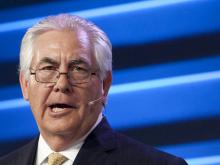
Donald Trump’s pick for secretary of state, ExxonMobil CEO Rex Tillerson, has come under fire for his friendship with Russian president Vladimir Putin – who is suspected of trying to tip the election to Trump – his lack of diplomatic experience, and the fact that he is a corporate bigwig who champions fossil fuels, even as the threat of global warming grows.
But Tillerson, whose nomination was announced on Dec. 13, may also face criticism from an unexpected quarter – social conservatives whose support was critical to Trump’s unexpected election last month.

In 2013, Francis provoked an outcry from economic conservatives with the release of his apostolic exhortation, “Evangelii Gaudium (The Joy of the Gospel),” which was widely seen as his personal manifesto. In it, Francis said the world could no longer trust “the unseen forces and the invisible hand of the market,” and called for ecclesiastical renewal and compassion for the poor.
Cox, who taught at Harvard for 50 years, dedicated his latest book to the pope because they share a concern about what Francis called a “deified market” that’s creating “new idols.”
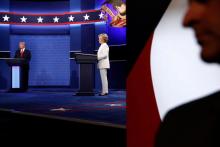
For some, the choice is not clear. Clinton-Kaine may be the more personally religious ticket, but Trump-Pence is more cozy with the religious right, aka the evil empire among atheists. Then there’s Green Party candidate Jill Stein, who has no chance of victory, but is the only candidate who reached out to nonbelievers and asked for their vote.
So what’s an atheist to do?
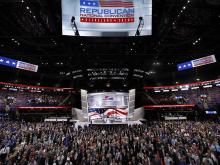
In a section titled “Defending Marriage Against an Activist Judiciary,” Republicans say they “condemn” the Supreme Court’s ruling in Obergefell v. Hodges, which made same-sex marriage the law of the land. Religious conservatives from several denominations also have opposed this ruling as the work of “activist judges,” a charge and a term echoed in the platform.

Heading into Donald Trump’s meeting with hundreds of conservative Christian leaders, mostly evangelicals, in New York on June 21, it was clear not all Christians have lined up behind him.
Not even all traditionally conservative evangelicals.
